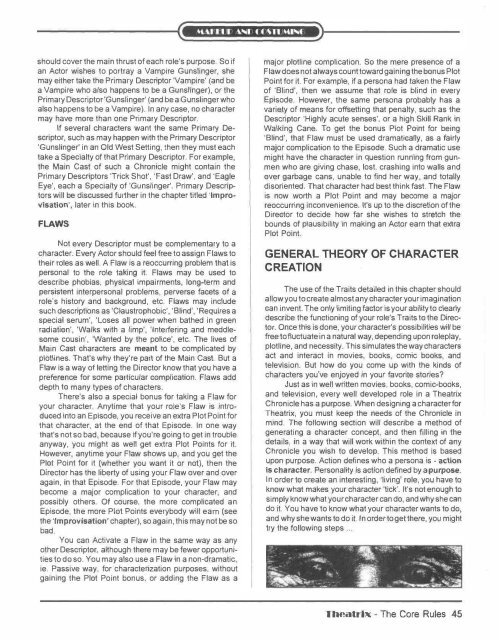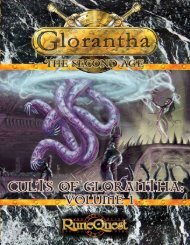Untitled - Index of - Free
Untitled - Index of - Free
Untitled - Index of - Free
You also want an ePaper? Increase the reach of your titles
YUMPU automatically turns print PDFs into web optimized ePapers that Google loves.
should cover the main thrust <strong>of</strong> each role's purpose. So if<br />
an Actor wishes to portray a Vampire Gunslinger, she<br />
may either take the Primary Descriptor 'Vampire' (and be<br />
a Vampire who also happens to be a Gunslinger), or the<br />
Primary Descriptor 'Gunslinger' (and be a Gunslinger who<br />
also happens to be a Vampire). In any case, no character<br />
may have more than one Primary Descriptor.<br />
If several characters want the same Primary De<br />
scriptor, such as may happen with the Primary Descriptor<br />
'Gunslinger' in an Old West Setting, then they must each<br />
take a Specialty <strong>of</strong> that Primary Descriptor. For example,<br />
the Main Cast <strong>of</strong> such a Chronicle might contain the<br />
Primary Descriptors 'Trick Shot', 'Fast Draw', and 'Eagle<br />
Eye', each a Specialty <strong>of</strong> 'Gunslinger'. Primary Descrip<br />
tors will be discussed further in the chapter titled 'Impro<br />
visation', later in this book.<br />
FLAWS<br />
Not every Descriptor must be complementary to a<br />
character. Every Actor should feel free to assign Flaws to<br />
their roles as well. A Flaw is a reoccurring problem that is<br />
personal to the role taking it. Flaws may be used to<br />
describe phobias, physical impairments, long-term and<br />
persistent interpersonal problems, perverse facets <strong>of</strong> a<br />
role's history and background, etc. Flaws may include<br />
such descriptions as 'Claustrophobic', 'Blind', 'Requires a<br />
special serum', 'Loses all power when bathed in green<br />
radiation', 'Walks with a limp', 'Interfering and meddle<br />
some cousin', 'Wanted by the police', etc. The lives <strong>of</strong><br />
Main Cast characters are meant to be complicated by<br />
plotlines. That's why they're part <strong>of</strong> the Main Cast. But a<br />
Flaw is a way <strong>of</strong> letting the Director know that you have a<br />
preference for some particular complication. Flaws add<br />
depth to many types <strong>of</strong> characters.<br />
There's also a special bonus for taking a Flaw for<br />
your character. Anytime that your role's Flaw is intro<br />
duced into an Episode, you receive an extra Plot Point for<br />
that character, at the end <strong>of</strong> that Episode. In one way<br />
that's not so bad, because if you're going to get in trouble<br />
anyway, you might as well get extra Plot Points for it.<br />
However, anytime your Flaw shows up, and you get the<br />
Plot Point for it (whether you want it or not), then the<br />
Director has the liberty <strong>of</strong> using your Flaw over and over<br />
again, in that Episode. For that Episode, your Flaw may<br />
become a major complication to your character, and<br />
possibly others. Of course, the more complicated an<br />
Episode, the more Plot Points everybody will earn (see<br />
the 'Improvisation' chapter), so again, this may not be so<br />
bad.<br />
You can Activate a Flaw in the same way as any<br />
other Descriptor, although there may be fewer opportuni<br />
ties to do so. You may also use a Flaw in a non-dramatic,<br />
ie. Passive way, for characterization purposes, without<br />
gaining the Plot Point bonus, or adding the Flaw as a<br />
major plotline complication. So the mere presence <strong>of</strong> a<br />
Flaw does not always count toward gaining the bonus Plot<br />
Point for it. For example, if a persona had taken the Flaw<br />
<strong>of</strong> 'Blind', then we assume that role is blind in every<br />
Episode. However, the same persona probably has a<br />
variety <strong>of</strong> means for <strong>of</strong>fsetting that penalty, such as the<br />
Descriptor 'Highly acute senses', or a high Skill Rank in<br />
Walking Cane. To get the bonus Plot Point for being<br />
'Blind', that Flaw must be used dramatically, as a fairly<br />
major complication to the Episode. Such a dramatic use<br />
might have the character in question running from gun<br />
men who are giving chase, lost, crashing into walls and<br />
over garbage cans, unable to find her way, and totally<br />
disoriented. That character had best think fast. The Flaw<br />
is now worth a Plot Point and may become a major<br />
reoccurring inconvenience. It's up to the discretion <strong>of</strong> the<br />
Director to decide how far she wishes to stretch the<br />
bounds <strong>of</strong> plausibility in making an Actor earn that extra<br />
Plot Point.<br />
GENERAL THEORY OF CHARACTER<br />
CREATION<br />
The use <strong>of</strong> the Traits detailed in this chapter should<br />
allow you to create almost any character your imagination<br />
can invent. The only limiting factor is your ability to clearly<br />
describe the functioning <strong>of</strong> your role's Traits to the Direc<br />
tor. Once this is done, your character's possibilities will be<br />
free to fluctuate in a natural way, depending upon roleplay,<br />
plotline, and necessity. This simulates the way characters<br />
act and interact in movies, books, comic books, and<br />
television. But how do you come up with the kinds <strong>of</strong><br />
characters you've enjoyed in your favorite stories?<br />
Just as in well written movies, books, comic-books,<br />
and television, every well developed role in a Theatrix<br />
Chronicle has a purpose. When designing a character for<br />
Theatrix, you must keep the needs <strong>of</strong> the Chronicle in<br />
mind. The following section will describe a method <strong>of</strong><br />
generating a character concept, and then filling in the<br />
details, in a way that will work within the context <strong>of</strong> any<br />
Chronicle you wish to develop. This method is based<br />
upon purpose. Action defines who a persona is - action<br />
is character. Personality is action defined by a purpose.<br />
In order to create an interesting, 'living' role, you have to<br />
know what makes your character 'tick'. It's not enough to<br />
simply know what your character can do, and why she can<br />
do it. You have to know what your character wants to do,<br />
and why she wants to do it. In order to get there, you might<br />
try the following steps ...<br />
Theatr-lx- The Core Rules 45



